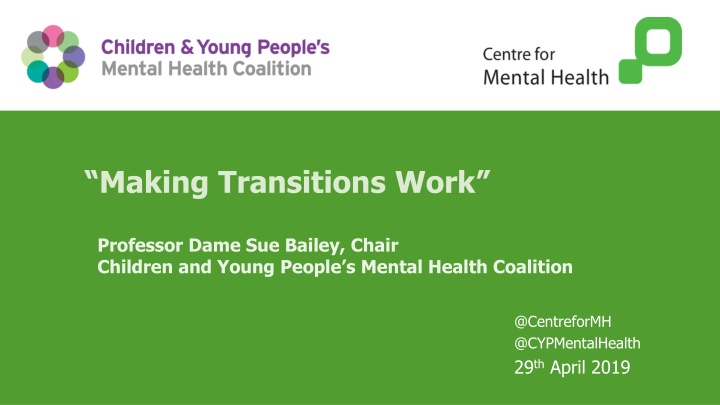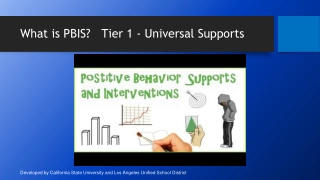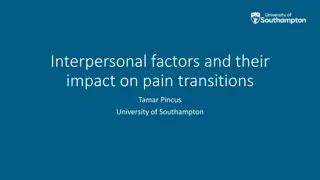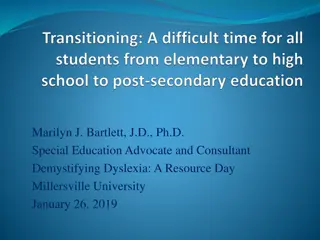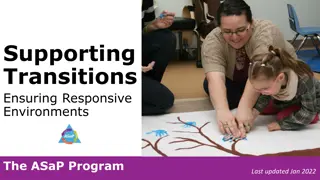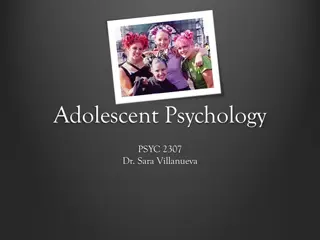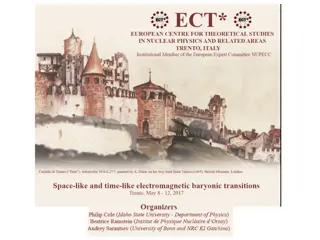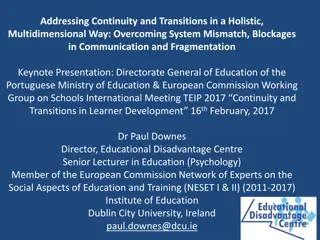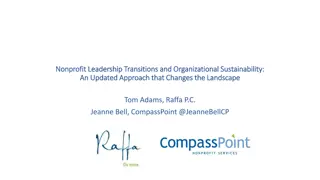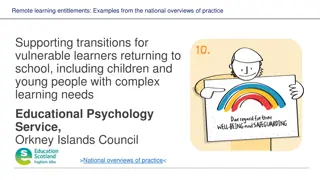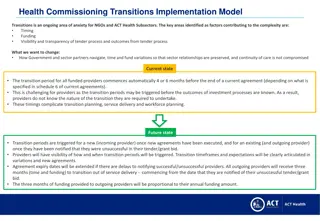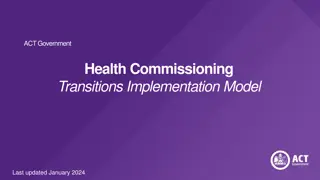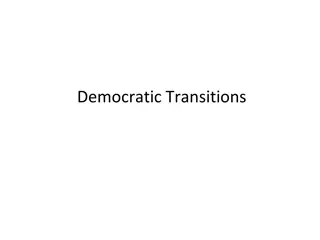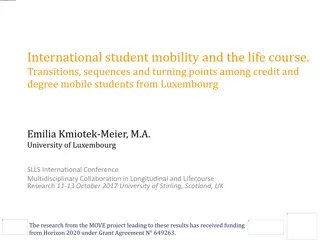“Making Transitions Work”
The Children and Young People's Mental Health Coalition, led by Professor Dame Sue Bailey, advocates for policy influence and support for the mental health and wellbeing of children and young people. Working with over 180 organizations, they prioritize prevention, early intervention, and skills development to address mental health needs. Their focus on effective transitions from youth to adult services highlights the importance of proper support during this vulnerable period. Through research, advocacy, and community engagement, the coalition aims to create a society that prioritizes and invests in the mental health of all young individuals.
Download Presentation

Please find below an Image/Link to download the presentation.
The content on the website is provided AS IS for your information and personal use only. It may not be sold, licensed, or shared on other websites without obtaining consent from the author.If you encounter any issues during the download, it is possible that the publisher has removed the file from their server.
You are allowed to download the files provided on this website for personal or commercial use, subject to the condition that they are used lawfully. All files are the property of their respective owners.
The content on the website is provided AS IS for your information and personal use only. It may not be sold, licensed, or shared on other websites without obtaining consent from the author.
E N D
Presentation Transcript
Making Transitions Work Professor Dame Sue Bailey, Chair Children and Young People s Mental Health Coalition @CentreforMH @CYPMentalHealth 29thApril 2019
Children and Young Peoples Mental Health Coalition We work with over 180 organisations to campaign and influence policy, with and on behalf of children and young people in relation to their mental health and wellbeing. Proud to be hosted by Centre for Mental Health
Centre for Mental Health The Centre for Mental Health are a charity with over 30 years experience in providing life changing research, economic analysis and policy influence in mental health. www.centreformentalhealth.org.uk Follow us on social @CentreforMH
Our Vision For all infants, children and young people to grow up in a society that prioritises, invests, listens and attends to their mental health and wellbeing.
What We Do Listen to, and learn from members, supporters, children, young people and families Influence and shape policy, systems and practice Advocate a whole-system approach underpinned by core principles
Our Priorities Prevention of MH problems: universal & targeted approaches for those living with and in the most challenging circumstances Bolder approaches to investment in high quality, person-centred early intervention provision in community/education settings Everyone has the skills and confidence to recognise and address the mental health needs of infants, children and young people
Transition: a period of heightened vulnerability and opportunity? The transition from children s to adult services is an issue across the whole of healthcare It is well established that the brain does not fully mature until about age 25, and so a young person may not be developmentally ready to move to adult mental health services at 18. Lifelong consequences associated with poorly managed transitions for young people with mental health needs Half of mental health problems emerge before the age of 14 and around three quarters are established by the age of 24. Source: Blakemore, S-J. (2013) https://www.edge.or g/response-detail/23798
Transition based on need not age National CAMHS Review (2008) concluded chronological age is not the best determinant for appropriate service provision. Future in Mind (2015) reaffirmed transitions from children s services based on the needs of the young person, rather than a particular age.
Learning from the voluntary and community sector There are also well established and pioneering voluntary sector services that are aimed at 16-25 year olds. Youth, Information, Advice and Counselling Services (YIACS) for instance, are available across the country and provide easy, community based access to a range of support under one roof. Future in Mind recommends that these one-stop-shops be a key part of the universal local offer and build on the existing network of YIACS.
Improving the mental health and wellbeing of young people during transition We have been are calling for: Invest in support for young people aged 16-25, who require support in the transition to adult mental health services, and into adulthood generally. Greater coordination, is also needed between mental health service providers and key agencies such as education, social care and substance misuse services. Evaluating and evidencing what works, There are a few service models which have been set up to address issues surrounding transitions. These services need to be evaluated to ensure that they are effective for all children and young people.
Mental health spectrum We all have mental health
Supporting young people transitioning in education What we did: Literature review Interviews and focus groups Survey Involving students and staff at: Comprehensive school Special school Independent school FE college
School is a place of reliable, informal and personalised support Moving onto university as an important rite of passage towards adulthood Young people are worried about transitions, but feel pressure to do it on their own
Romantic relationships Having a good social life Living independently Easy access to drugs and alcohol Identity issues Managing finances Keeping safe Academic pressures
Continuity of MH care is important Practical factors which support a positive transition Teachers and university/ FE college - more communication about students NHS England and CCGs should ensure continuity of care for young people in CAMHS throughout their education, including the transition to university / FE college Extended transitions Our report welcomes the NHS Long Term Plan scommitment to extend current service models to create a comprehensive offer for 0- 25 year olds Better data to compare universities
Reflections: Nothing about me without me Transitions truly matter if we want healthy health creating societies Transitions are everybody's business stretching across health, social care, education, world of work leisure and justice Key is equipping the whole workforce to be able to support young people whatever their state of health or social context Transitions are embedded in a developmental understanding of human beings where young people have the right to fairness, protection and autonomy Listen to the experts young people themselves, utilise all the evidence base Deliver on values based practice through shared decision making with young people. "Nothing about me without me"
